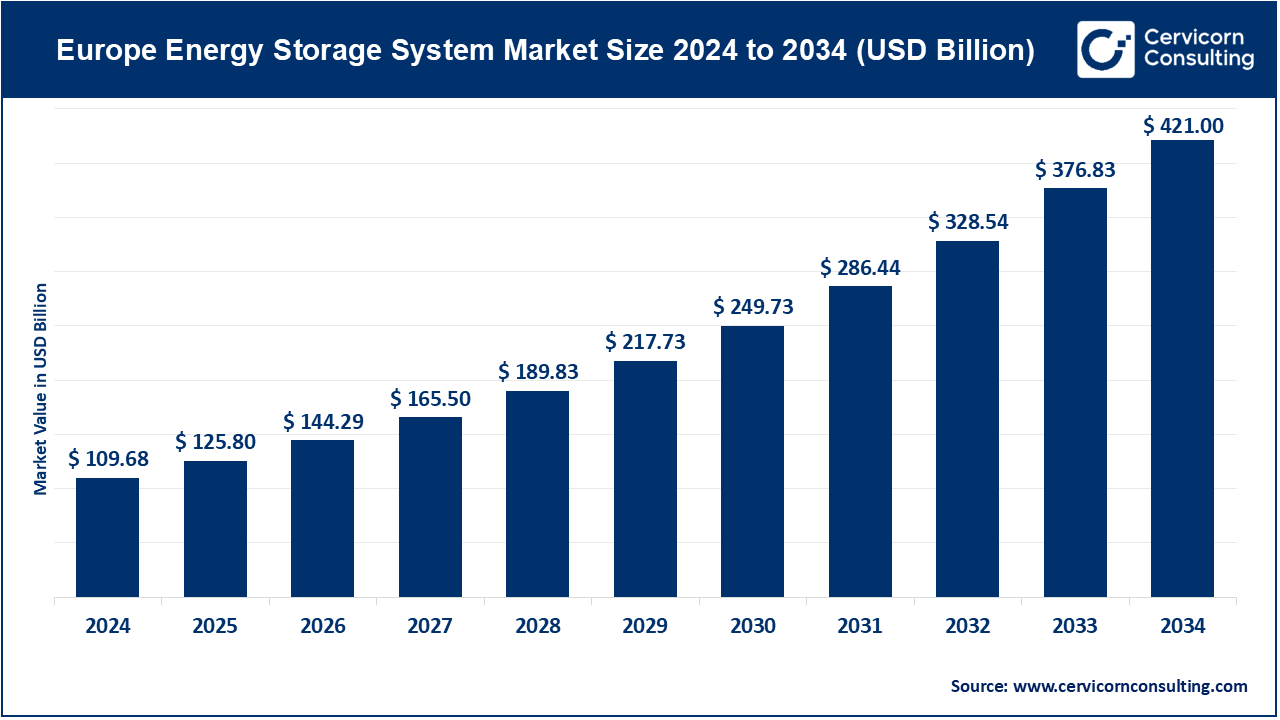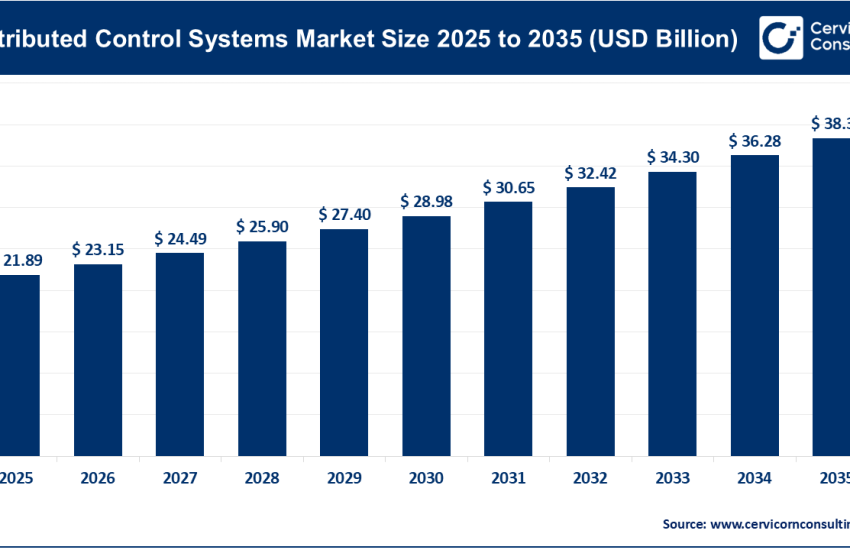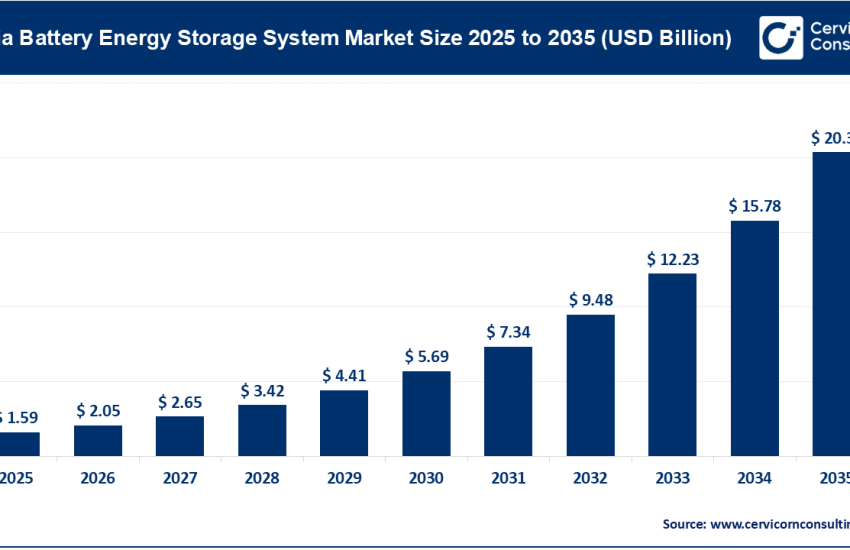Europe Energy Storage System Market Growth, Trends & Insights by 2034
Europe Energy Storage System Market Growth
The Europe energy storage system market was worth USD 109.68 billion in 2024 and is anticipated to expand to around USD 421 billion by 2034, registering a compound annual growth rate (CAGR) of 14.68% from 2025 to 2034.
The Europe energy storage system market has been witnessing significant growth driven by the region’s increasing adoption of renewable energy, government policies promoting sustainability, and technological advancements in energy storage solutions. The European Union’s Green Deal, aiming for net-zero carbon emissions by 2050, has created a robust policy framework for clean energy technologies. This has further accelerated the demand for energy storage systems, which help integrate intermittent renewable sources like wind and solar into the grid, stabilize energy supply, and provide backup during energy shortfalls.
Additionally, growing concerns over energy security, coupled with rising electricity costs and the transition to decentralized energy generation, have fueled the adoption of energy storage systems. Market players are also capitalizing on the rapid advancements in battery storage technologies, such as lithium-ion and flow batteries, to enhance efficiency, reliability, and cost-effectiveness. With the European Commission investing heavily in digital infrastructure and smart grid technologies, the market is poised for further growth in the coming years.
What is the Europe Energy Storage System Market?
The Europe energy storage system market refers to the industry involved in the development, manufacturing, and deployment of energy storage solutions in the region. These systems are designed to store energy produced during periods of high generation and release it when demand exceeds supply, thus ensuring the reliability, stability, and resilience of the power grid. Energy storage is critical for balancing renewable energy generation with consumption, enabling grid operators to manage energy loads more efficiently. The market includes a wide range of energy storage technologies, such as lithium-ion batteries, pumped hydro storage, compressed air energy storage (CAES), and thermal energy storage systems. As the demand for renewable energy continues to surge, energy storage has become a vital component of Europe’s energy infrastructure.
Why is it Important?
The Europe energy storage system market plays a pivotal role in addressing several critical energy challenges faced by the region. First, energy storage enables the integration of renewable energy sources into the grid, which is essential for the EU’s ambitious goals to transition to a low-carbon economy. Renewables, such as solar and wind, are intermittent in nature, meaning they cannot always be relied upon to meet demand. Energy storage systems mitigate this issue by storing excess energy produced during periods of high renewable generation and discharging it when generation is low or demand is high.
Secondly, energy storage contributes to grid stability and reliability. With the growing complexity of energy systems, storage technologies offer solutions to balance supply and demand, reducing the risks of blackouts or power disruptions. Additionally, energy storage systems support the deployment of smart grids, which enhance the efficiency and flexibility of electricity distribution, allowing consumers to take advantage of lower electricity prices during off-peak periods.
Lastly, the importance of energy storage is underscored by the European Union’s efforts to improve energy security and reduce dependency on fossil fuels, particularly in light of geopolitical tensions and global energy price fluctuations. By enhancing grid resilience, energy storage systems are key to maintaining energy security while reducing the environmental impact of traditional power generation methods.
Get a Free Sample: https://www.cervicornconsulting.com/sample/2473
Market Share & Leading Companies in the Europe Energy Storage System Market
- CMBlu Energy AG
- Specialization: CMBlu Energy specializes in the development of innovative energy storage systems based on organic redox flow batteries, offering sustainable solutions for long-duration storage.
- Key Focus Areas: Clean energy, long-duration energy storage, flow batteries, renewable energy integration.
- Notable Features: CMBlu Energy’s organic redox flow batteries provide an alternative to traditional lithium-ion batteries, offering benefits like higher efficiency, longer lifespan, and greater sustainability.
- 2023 Revenue (approx.): $100 million
- Market Share (approx.): 2-3%
- Contemporary Amperex Technology Co. Ltd. (CATL)
- Specialization: CATL is a leading manufacturer of lithium-ion batteries for energy storage systems, electric vehicles (EVs), and other applications.
- Key Focus Areas: Lithium-ion batteries, electric mobility, energy storage for grid balancing, renewable energy solutions.
- Notable Features: CATL is known for its innovative battery technologies that deliver high performance, long life cycles, and sustainability.
- 2023 Revenue (approx.): $21.5 billion
- Market Share (approx.): 18-20%
- Deutsche Telekom AG
- Specialization: Deutsche Telekom operates in various sectors, including energy storage solutions, by providing digital infrastructure and innovative smart grid technologies.
- Key Focus Areas: Digital energy solutions, smart grids, energy management systems.
- Notable Features: Deutsche Telekom is focused on leveraging 5G and IoT technologies to optimize energy storage and management across smart grids.
- 2023 Revenue (approx.): $120 billion
- Market Share (approx.): 2-3%
- EnBW Energie Baden Wurttemberg AG
- Specialization: EnBW specializes in energy storage systems, primarily focusing on integrating renewable energy into the grid through advanced storage technologies and smart grids.
- Key Focus Areas: Renewable energy integration, battery storage solutions, grid stabilization, energy infrastructure.
- Notable Features: EnBW offers energy storage services that support grid flexibility and efficiency, enabling a more sustainable energy transition.
- 2023 Revenue (approx.): $20 billion
- Market Share (approx.): 4-5%
- Enel Spa
- Specialization: Enel is a major player in the European energy market, with a strong focus on renewable energy generation and energy storage solutions to support grid resilience and decarbonization.
- Key Focus Areas: Renewable energy, energy storage, smart grids, decarbonization.
- Notable Features: Enel has invested heavily in energy storage and smart grid technologies to facilitate the integration of renewable energy into its operations.
- 2023 Revenue (approx.): $120 billion
- Market Share (approx.): 5-6%
Leading Trends and Their Impact
- Growth in Long-Duration Energy Storage Long-duration energy storage solutions, such as flow batteries and pumped hydro storage, are gaining traction in Europe. These systems can store energy for longer periods, providing a reliable backup during times of high demand or low renewable generation. The increased adoption of these technologies will help stabilize energy systems in the long term, particularly as Europe scales its renewable energy capacity.
- Hybrid Energy Storage Systems The combination of different energy storage technologies, such as battery storage and pumped hydro, is becoming more prevalent. These hybrid systems offer better scalability, efficiency, and flexibility, making them ideal for addressing the varying energy demands in Europe’s evolving grid systems.
- Integration with Smart Grids As smart grids become more widespread across Europe, energy storage systems are being integrated into these networks to improve grid management and optimize energy distribution. By enhancing the communication and automation capabilities of power grids, energy storage systems help achieve greater efficiency, lower costs, and higher reliability.
- Decentralization of Energy Generation The rise of decentralized energy generation, driven by solar power, wind farms, and local energy producers, has led to greater demand for localized energy storage solutions. These systems enable consumers and businesses to store excess energy produced on-site and use it during periods of peak demand, reducing reliance on centralized power grids.
Successful Examples of Europe Energy Storage System Market
- The Hornsdale Power Reserve (Australia) – Impact on Europe While located in Australia, the Hornsdale Power Reserve is a model for energy storage systems worldwide, including Europe. It has demonstrated the viability of large-scale battery storage for stabilizing grids and improving the integration of renewable energy. European countries, particularly those in the UK and Germany, are adopting similar models for grid storage.
- The Tesla Megapack in the UK Tesla’s Megapack, a utility-scale battery storage system, has been deployed in several European countries, including the UK, to balance supply and demand and stabilize the grid. These projects have proven successful in reducing reliance on fossil fuels and enhancing the integration of renewable energy sources.
Government Initiatives and Policies Shaping the Market
- European Green Deal The European Green Deal, launched in 2019, is one of the most influential policies in the energy sector, with a focus on achieving net-zero emissions by 2050. The deal includes measures to boost the use of renewable energy, improve energy efficiency, and promote sustainable technologies like energy storage systems.
- Horizon 2020 The Horizon 2020 program is the EU’s largest research and innovation initiative, supporting the development of next-generation energy storage technologies. It provides funding for projects that aim to improve the efficiency, cost-effectiveness, and sustainability of energy storage systems.
- National Subsidies and Incentives Several European countries, including Germany, the UK, and France, offer national subsidies and incentives to encourage the adoption of energy storage systems. These incentives reduce the initial capital investment required for energy storage projects and make them more financially attractive for consumers and businesses.
- Energy Storage System Directive The EU has introduced specific regulations governing the deployment of energy storage systems. These include rules on market access, grid services, and integration with renewable energy sources. The directive aims to create a more uniform and supportive regulatory environment for energy storage across member states.
To Get Detailed Overview, Contact Us: https://www.cervicornconsulting.com/contact-us
Read Report: Europe Biofuels Market Growth, Key Trends & Leading Players by 2034



